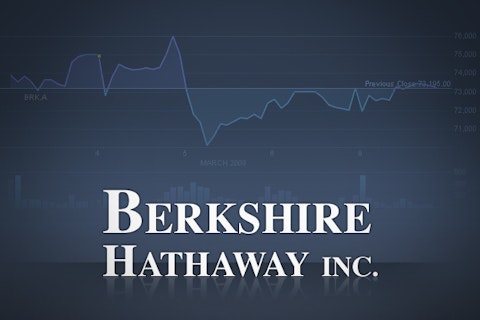The broad-based S&P 500 (INDEXSP:.INX) might be 4% off its all-time high set in early August, but you’ll find no shortage of optimists among investors.
Although justifiable concerns persist that the Federal Reserve’s inevitable tapering of its monthly bond-buying program is going to cause lending rates to go up and will hamper any turnaround in the housing industry, plenty of U.S. economic data would lend credence that this rally could continue higher.
Initial weekly jobless claims are still humming along very much near a six-year low, which is helping to push the unemployment rate to levels not seen since December 2008. Lower unemployment would signal that businesses of all sectors are hiring and would be a positive for consumer spending, which is the lifeblood of U.S. GDP growth. In addition, second-quarter U.S. GDP figures were recently revised upward to growth of 2.5%, demonstrating that the U.S. economy is on stronger footing than many had suspected.

Here are the S&P 500’s five most loved stocks:
| Company | Short Interest As a % of Outstanding Shares |
|---|---|
| Berkshire Hathaway Inc. (NYSE:BRK.B) | 0.00% |
| TE Connectivity Ltd. (NYSE:TEL) | 0.37% |
| Philip Morris International Inc. (NYSE:PM) | 0.56% |
| Brown-Forman Corporation (NYSE:BF.B) | 0.57% |
| McKesson | 0.58% |
Source: S&P Capital IQ.
Berkshire Hathaway
Why are short-sellers avoiding Berkshire Hathaway Inc. (NYSE:BRK.B)?
- Whether it’s in reverence of Warren Buffett’s 83rd birthday, or the immense diversity that Berkshire Hathaway Inc. (NYSE:BRK.B) offers investors, short-sellers want absolutely nothing to do with betting against this stock. Following Berkshire’s acquisition of NV Energy, Berkshire Hathaway will have 58 different companies under its belt spread across a myriad of industries. If retail is doing poorly, then its insurance division steps up. If the insurance sector is weak, Berkshire’s transport holdings can step up. With pretty much an answer to any economic weakness, there’s little incentive for short-sellers to bet against Berkshire Hathaway Inc. (NYSE:BRK.B).
Do investors have a reason to worry?
- Unless there’s a full-fledged depression, Berkshire Hathaway Inc. (NYSE:BRK.B) is going to hold its own without too much worry. Berkshire is set up in a way that it delivers increasing book value to shareholders from generally slow but steadily growing companies, of which many provide the basic needs of life. Many of you know my stance about betting against basic needs companies, and I certainly wouldn’t suggest betting against Berkshire Hathaway Inc. (NYSE:BRK.B).
TE Connectivity
Why are short-sellers avoiding TE Connectivity Ltd. (NYSE:TEL)?
- TE Connectivity Ltd. (NYSE:TEL), a provider of electronic components that helps control and protect the flow of power in electronic devices in the transportation, industrial, and networking industries — and a newcomer to the most-loved list — probably finds itself on here for two reasons. First, TE Connectivity is consistent and has topped Wall Street’s EPS expectations in each of the past six quarters. Benefiting from new tech cycles, TE Connectivity Ltd. (NYSE:TEL) should be basking in the huge infrastructure expansion currently under way in the wireless telecommunications space in the United States. In addition, short-sellers often avoid dividend-paying companies, as dividends often signal strong cash flow and a healthy company. With a 2% yield, TE Connectivity is easily driving away the pessimists.
Do investors have a reason to worry?
- Although TE Connectivity Ltd. (NYSE:TEL)’s recent earnings history would suggest the company is on the right track, I believe optimists may want to taper their expectations here a bit. Sales growth this year is expected to be flat, with just 6% growth expected in fiscal 2014. Yet TE Connectivity is valued at 16 times forward earnings, which seems a bit high for such a modest growth rate. There’s also the possibility that reduced government spending could weigh on TE Connectivity Ltd. (NYSE:TEL)’s largest customers, which has the potential to slow down orders and hurt its bottom line. The company is fairly well positioned over the very long term but certainly could see some hiccups in the interim.

Source: Debbie Tingzon, Flickr.
Philip Morris International
Why are short-sellers avoiding Philip Morris International Inc. (NYSE:PM)?
- The reasons we looked at last month as to why global tobacco producer Philip Morris International is almost a universally avoided name among short-sellers still rings true. As an international tobacco producer, Philip Morris International Inc. (NYSE:PM) is able to spread out its regulatory risk among dozens of countries, as opposed to highly owned tobacco producers such as Altria that run the risk of increasing government regulation of tobacco products within the United States. Also, selling tobacco, a highly addictive but legal substance, allows for Philip Morris to maintain incredible pricing power and pass along price increases to consumers if cigarette volume shipments fall.




